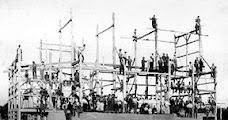| Tuesday August 10, 2010 Since my son Dylan was born I have been constantly amazed by the magic of his learning. Is learning for children (pedagogy) really that different from learning for adults (andragogy)? Here are a few facts I have collected that might help clarify the difference. I hope these ideas can help you clarify what challenges you might encounter next time you are asked to teach a class at work -- or to entertain a group of children at a party! Children are natural learners and their readiness to learn is rooted in biological development. Adult learners need to take a break from "doing things" before they can get into the "learning mode." Adult learners view learning as a solution to cope with something that is impacting their immediate circumstances. For adults, learning is often sought out as a way to solve a problem or to deal better with something new. As such, adult learners are "problem-centered" and want to immediately apply new information or skills to current problems or situations. Children have a limited experience base. Adult learners have a powerful resource for the learning process: their rich life experience; and they use it actively as they continuously relate new information to previously learned knowledge and experiences. Unfortunately, adult learners are more set in their ways, and are much more likely to reject or explain away new information that contradicts their values, beliefs and opinions. Children, in turn, are open to new information and will readily adjust their views. (I say this, despite having a two-year-old with hearty attachments to his toy alligator and other strong opinions. It's a phase, right?) Children do not have to deal with the anxiety of the "un-learning" process before constructing new knowledge. Adult learners are proud. When a classroom environment is not perceived as safe or supportive, major issues of self-esteem and ego tend to degenerate into conflict. Adults perceive any lack of skill or knowledge as a gap that must be filled as quickly as possible to defend their acquired sense of professionalism and competence. Children do not question the importance of the learning content. Adults have preconceived ideas about what is important to learn and why. Children can be easily segmented by age when they come from similar socioeconomic backgrounds, etc. Adults exhibit significant differences and complexity as individuals, making them much harder to teach in a group with shared learning goals. Adriano Pianesi
ParticipAction Consulting Inc. | www.participactioninc.com
306 Aspen Place, Alexandria, Virginia 22305 Ph: 703-920-0208 | Fax: 703-562-0856 | Cell: 202-262-3371 Follow me on Twitter
back to top  | ![]()
![]()

